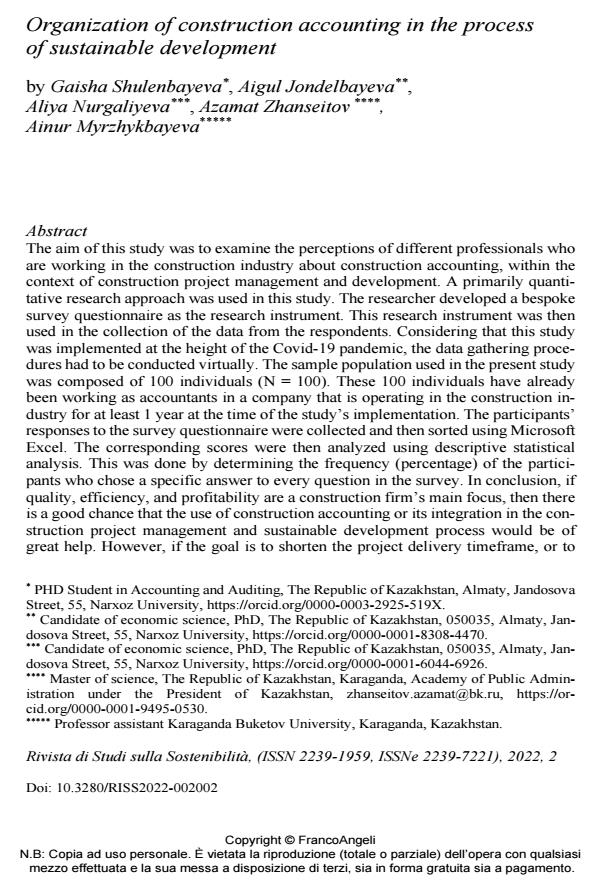Organization of construction accounting in the process of sustainable development
Journal title RIVISTA DI STUDI SULLA SOSTENIBILITA'
Author/s Gaisha Shulenbayeva, Aigul Jondelbayeva, Aliya Nurgaliyeva, Azamat Zhanseitov, Ainur Myrzhykbayeva
Publishing Year 2023 Issue 2022/2
Language English Pages 18 P. 11-28 File size 201 KB
DOI 10.3280/RISS2022-002002
DOI is like a bar code for intellectual property: to have more infomation
click here
Below, you can see the article first page
If you want to buy this article in PDF format, you can do it, following the instructions to buy download credits

FrancoAngeli is member of Publishers International Linking Association, Inc (PILA), a not-for-profit association which run the CrossRef service enabling links to and from online scholarly content.
The aim of this study was to examine the perceptions of different professionals who are working in the construction industry about construction accounting, within the context of construction project management and development. A primarily quantitative research approach was used in this study. The researcher developed a bespoke survey questionnaire as the research instrument. This research instrument was then used in the collection of the data from the respondents. Considering that this study was implemented at the height of the Covid-19 pandemic, the data gathering procedures had to be conducted virtually. The sample population used in the present study was composed of 100 individuals (N = 100). These 100 individu-als have already been working as accountants in a company that is operating in the construction industry for at least 1 year at the time of the study’s implementa-tion. The participants’ responses to the survey questionnaire were collected and then sorted using Microsoft Excel. The corresponding scores were then analyzed using descriptive statistical analysis. This was done by determining the frequency (percentage) of the participants who chose a specific answer to every question in the survey. In conclusion, if quality, efficiency, and profitability are a construction firm’s main focus, then there is a good chance that the use of construction ac-counting or its integration in the construction project management and sustainable development process would be of great help. However, if the goal is to shorten the project delivery timeframe, or to improve the project completion rates (i.e., productivity), then chances are the construction firms should stay away from con-struction accounting, at least at the moment.
Keywords: accounting, construction accounting, sustainability, development pro-cess, project management.
- Celik I. (2016). Mathematics and excel based statistical lean accounting implementation on a construction industry firm. Beykent Üniversitesi Sosyal Bilimler Dergisi.
- Chandler D., Hardie M., Perera S. & Langston C. (2019). A proposed framework for measuring future construction industry performance. Routledge, pp. 215-234.
- Clough R., Sears G. & Sears K. (2000). Construction project management. John Wiley & Sons.
- Coetsee D. & Wyk M. (2020). The adequacy of IFRS 15 for revenue recognition in the construction industry. Journal of Economic and Financial Sciences, pp. 1-13.
- Davila M., Alonso M. & Gamez C. (2015). Managerial accounting for safety management. The case of a Spanish construction company. Safety Science, pp. 116-125.
- Foster S. (2020). Management Strategies for Improving Construction Industry Ethics. Dissertation, Walden University.
- Haider T. (2009). Financial management of construction contracts, constructability and its relation with TQM, cost shifting risk and cost/benefit. International Research Journal of Finance and Economics, pp. 42-51.
- Halpin D. & Senior B. (2009). Financial management and accounting fundamentals for construction. John Wiley & Sons.
- Holm L. (2018). Cost accounting and financial management for construction project managers. Routledge.
- Hong W. (2008). On Application of Task-driven Technique in the Teaching of Engineering Cost Accounting. Journal of Kumming Metallurgy College.
- Hussain S., Liu L. & Miller A. (2020). Accounting as a dichotomised discipline: An analysis of the source materials used in the construction of accounting articles. Critical Perspectives on Accounting.
- Jang Y., Jeong I. & Cho Y. (2020). Business failure prediction of construction contractors using a LSTM RNN with accounting, construction market, and macroeconomic variables. Journal of Management Engineering.
- Keisala J. (2010). Cost accounting methods for construction projects in North-West Russia.
- Lankauskiene T. (2016). Application of the growth accounting method for the construction industry. Journal of Business Economics and Management, pp. 430-443.
- Onaolapo A. & Odetayo A. (2012). Effect of accounting information system on organisational effectiveness: a case study of selected construction companies in Ibadan, Nigeria. American Journal of Business and Management, pp. 183-189.
- Peterson S. (2013). Construction accounting and financial management. Pearson.
- Salling K. & Leleur S. (2015). Accounting for the inaccuracies in demand forecasts and construction cost estimations in transport project evaluation. Transport Policy, pp. 8-18.
- Schwarz L. (2019). Project Accounting Concepts and Business Calculations.
- Tang J., Zhang M., Tang H. & Chen Y. (2015). Research on cost management of construction project based on activity-based costing. International Conference on Civil, Materials and Environmental Sciences.
- Tuovila A. (2020). Managerial Accounting.
- Wustemann J. & Kierzek S. (2005). Revenue recognition under IFRS revisited: conceptual models, current proposals and practical consequences. Accounting in Europe, pp. 69-106.
- Ying H. (2016). The highway construction cost control model based on the improved earned value method theory. IEEE.
Gaisha Shulenbayeva, Aigul Jondelbayeva, Aliya Nurgaliyeva, Azamat Zhanseitov, Ainur Myrzhykbayeva, Organization of construction accounting in the process of sustainable development in "RIVISTA DI STUDI SULLA SOSTENIBILITA'" 2/2022, pp 11-28, DOI: 10.3280/RISS2022-002002